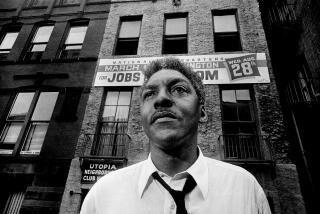In today’s world, you’ll never walk alone
- Share via
WASHINGTON — These are rough days for the “rat-terrier community,” the “heavy-metal community,” the “porn community” and the “arms community,” among other communities in the world’s expanding community of communities.
But these are bright days for “community” in general, the term if not the concept.
There is a community for everyone -- canker sore sufferers, panty lovers, Duran Duran fans, goat owners -- to a point where they are proliferating into a community of self-parody.
Although “community” has been a hackneyed term for decades -- terms such as “the black community,” “the gay community,” the “international disaster relief community” and the “investor community” have long been overapplied to diverse and fractured realms -- the Internet has provided a spaceless “place” for communities to convene.
The journalism community loves communities, or at least calling things communities, no matter how tenuous or irrelevant the designations might be.
“Speaking as a member of the journalism criticism community,” said Bob Garfield, a host of National Public Radio’s “On the Media” and a columnist for Advertising Age, “I find that calling something a ‘community’ is yet another journalistic crutch that leans heavily on a foundation that doesn’t really exist.”
By naming something a “community,” we impose a faux-descriptive category on what is generally a random phenomenon.
For instance, the slaying of Bobbie Jo Stinnett, the Missouri woman who was eight months pregnant and whose fetus was cut from her body, would outrage anyone with a shred of humanity (if not community). But because the killing was alleged to have been perpetrated by a woman who learned about Stinnett online “from the rat-terrier community” (according to CNN), the incident struck that community particularly hard.
And the onstage slaying of Pantera founder “Dimebag” Darrell Abbott at an Ohio nightclub devastated “the heavy-metal community,” according to members of the aggrieved community -- or, more likely, reporters who wrote about them.
But the promiscuity of community is more than purely a media phenomenon.
Groups of people often strain to identify themselves as a community -- particularly when one of their own dies (say, a member of “the NASCAR community” after a crash), or is inconvenienced (a member of “the air travel community” over the holiday weekend) or has reason to celebrate (the “ ‘Star Wars’ community” when a new movie is released).
We also hear a lot from the ham radio community, the Mac users community, the irritable bowel syndrome community, the transgender community, the swingers community, the peanut allergy community and the vegan community and the stoner community. Even the anarchist community, which would seem to be a contradiction, has chapters across the country and is ubiquitous on the Web.
“Community evokes a sense of warm fuzziness on a group of people who have only the most superficial bonds,” said Amitai Etzioni, a sociologist at George Washington University in Washington, D.C., who has written extensively about the “community of communities” worldwide.
Etzioni said the term “community” has not been overused as much as it has been abused. He said an authentic community must include both genuine bonds of affection and shared moral values.
“That should be the test of a community,” Etzioni said, “not whether someone simply calls them a community.”
We celebrate this man as a pillar of the community-restraint community.
More to Read
Sign up for Essential California
The most important California stories and recommendations in your inbox every morning.
You may occasionally receive promotional content from the Los Angeles Times.













